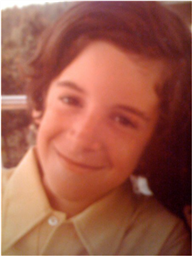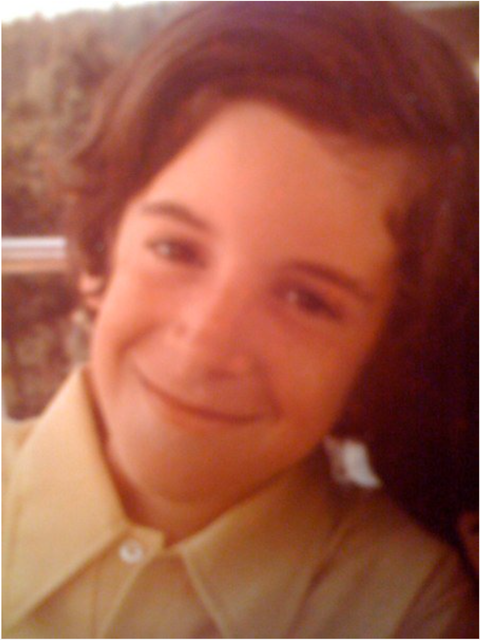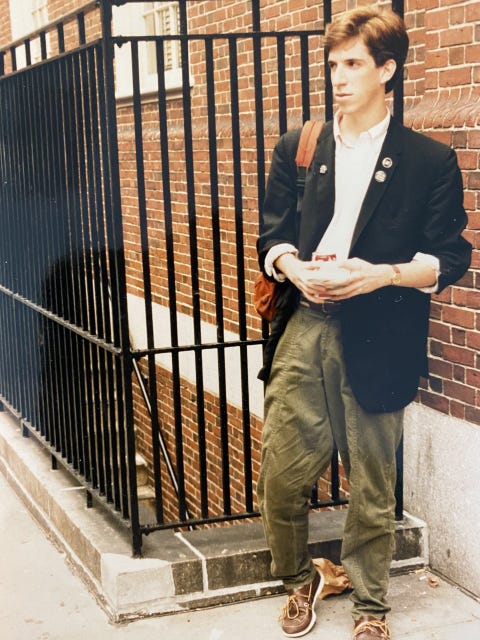My Daughter Asked if I Was Bi. I’m Proud of What I Told Her.

My finger slid up the screen of my phone. I’d just finished a true crime podcast and I was scrolling, searching for the next cold case I could escape into. I looked up as my daughter swept into the kitchen with body language I read as I have a question. I was expecting something along the lines of “Mommy wants to know where the Melatonin gummies are” or something to that effect. I was way off.
“Daddy, are you bi?”
In an instant, my brain shorted out, the lights flickering and going dark as an icy hot sensation raced through my body and my heart began galloping in my chest. The warm safety of the kitchen vanishing as if our suburban home had depressurized, the magnet wall covered with family photos, first-grade artwork and our vaccine cards tearing open and sucking me through it into empty black space.
On the outside, I imagine my eyes remained fixed on my daughter, my expression suggesting that I was, as Dads do, thinking about how best to respond. Over the years, I’d learned to mask my anxiety so I could function even when my body was screaming at me you’re about to die or flashing horrific snuff films before my eyes of the terrifying things about to happen to me or someone I loved.
I took a long, slow breath. What was I going to say?
Am I bi? I’d been running from that question most of my life, smothering feelings and turning every queer thought into a weapon to beat myself up, as if those thoughts proved the bullies in grade school were right about me all along when they singled me out and called me a fag. I’d been the new kid in sixth grade, arriving in a new town shy and shut down in the wake of my parents’ divorce. I was awkward and quiet, unable to hit a baseball or sink a basketball.
School became something I dreaded, a place where threats loomed in the stairwells and hallways, away from the protection of teachers. After school, I’d rush home and watch television, where TV told me being different was dangerous—and where male bisexuality simply did not exist. I understood it just wasn’t an option, so I buried that part of me and began doing what I’d do for the next four decades: agonizing over what it would take, what I could possibly do, so that other boys might just accept me as guy enough—and later, “man enough.”
As an adult, I was liberated from childhood fears of being cornered by a bully in the stairwell at school. But I wasn’t free. My brain became my new bully, and it would torment me with thoughts that frightened me, disgusted me or filled me with doubts. Driving my car, I’d flinch at a sudden thought of being hit by another car. Sometimes, I felt certain I was about to be shot in the head. Sometimes I’d arrive home and have the vivid, unsettling thought that I had possibly hit someone while driving, a thought I wouldn’t be able to shake as my mind ran to thoughts the police would soon be knocking on my door. The intrusive thoughts felt real, made me question why I would think such things, and left me feeling vulnerable and filled with shame.
When self-medicating the anxiety added a new layer of chaos to my life, I went to a psychologist, and during therapy I was asked to voice the thoughts and fears that were making my life unmanageable. Recounting the vivid thoughts I’d had of people breaking into my home and hurting my dogs—fears that kept me from going out at times—I broke down crying, feeling the fear of the graphic images, but also the embarrassment of having to put words to them and speak them aloud.
The diagnosis was obsessive-compulsive disorder, and thankfully, medication was hugely helpful. Combined with therapy, I was able to reclaim a lot of my life. The intrusive thoughts would still come, but I could see them for what they were. I no longer needed to dwell on them or to try and understand what they meant. But even as I was getting better, I worked hard to keep my illness a secret.
People use OCD as shorthand for “neat” or “quirky” and laugh at it, unaware of how the truth of the illness destroys lives. I didn’t want to be subjected to ridicule, and I didn’t want people to have the weapon of mental illness to use against me. For a time, I attended 12-step meetings, and one saying from those rooms stuck with me: we’re only as sick as our secrets. I decided to face my fear head on, and I wrote about having mental illness. I realized that claiming the label of mentally ill had released a pressure valve somewhere. I’d defused the bomb that until now would tick loudly at night, making the world feel risky, making me feel like that sixth grader who saw danger around every corner.
“Remembering that I took that plunge—that I didn’t build in an escape plan—has been the thing that’s allowed me to live.”
OCD makes people second guess everything, and I’d ruined relationships by ruminating endlessly: is she the one? What if she’s not? How can I know? I needed to be sure. OCD told me it was the only way, and in convincing me of that, it had kept me from truly knowing what a real relationship was like. I was stuck in neutral until one day, my psychiatrist asked me, “Do you want to have kids one day?” I was past 40, with a great job and a nice car and a house with no furniture. I said yes, and he looked at me with an expression that said, you don’t even see it, do you? “Do you want to be the oldest Dad in kindergarten?”
Something clicked. I’d spent far too long looking to remove risk, to try and protect myself from the possibility of being hurt. All that had done was leave me isolated and afraid. I had pushed the woman who would become my wife to the breaking point. Was I really going to walk away just because I couldn’t run down every potential mistake ahead of time? My psychiatrist’s question had flipped a switch: I felt liberated. I felt ready to go all-in. Yes, I might get hurt. But I might also be happy—and that’s exactly what happened. In fact, deciding to put my fears aside and going all-in had done something else: it took away all the what-ifs that are hallmarks of OCD. Marriage and parenthood come with endless opportunities to what-if yourself into oblivion. But by jumping in anyway, I told myself, “I’m in this,” that I knew there were risks because that’s how life is, that there’s power in knowing you can get hurt, but opening your heart anyway. For 12 years now, I believe that’s been my superpower. Being a husband and a father is to be faced over and over again with the reality that you’re not perfect, that you make mistakes, that you hurt people and you get hurt yourself. But through it all, through the messy and the beautiful, ignoring OCD’s invitations to ask “what if” has kept me going. Remembering that I took that plunge—that I didn’t build in an escape plan—has been the thing that’s allowed me to live.
A few years ago, I went back to school to get a master’s and in that MFA program I did a lot of writing. I explored my anxiety and how trying to live my life without ever being hurt had been the most dangerous thing of all. I saw that my anxiety—and my reaction to it—went as far back as I could remember. And what stood out to me as I looked back on my life wasn’t just the fear, but also the shame.
That realization became clear as I was digging into an old moving box filled with decades-old calendars, journals and notebooks, the sharp smell of mildew scraping its way into nose. I pick up a Sports Illustrated swimsuit calendar and see a book underneath that immediately floods my mind with memories—none of them good. My hand hesitates, as if the book might open wide and bite me. Don’t touch it, a voice in my head whispers urgently, look at something else. This book, with its familiar cover, all shiny silver foil and boxy black letters, is my junior high school yearbook, and it stinks of childhood shame. In an instant I feel myself pushed up against the blue padded walls of the school gym, cornered as the class ended by a boy whose face and name somehow was never recorded when the memory of that day was gouged into the folds of my brain like hateful graffiti. “Say it,” he told me, leaning into my face as I searched over his shoulder for someone who might rescue me. “Say it.”
I open the book against my anxiety’s warning and flip through the pages wondering if the bully’s face will appear. Will I remember him? Does it matter? But the face that gives me a chill is my own. There I am, in the back of a group photo, smiling a closed-mouth smile that makes me sad. My hair is cringeworthy, and my shirt—what little I can see of it—reminds me of just how uncomfortable I was in my own skin.
“Keep up the good work,” reads the message written by the photo of one of my teachers, someone who clearly didn’t know enough about me to say anything else. I’d moved through those years trying to disappear into the background, leaving few traces that I’d been there, walking away with little but the shame of being forced against a wall by a kid who promised he’d beat me up if I didn’t say that I was gay.
What clicks for me as I look at my photo in the yearbook is how intertwined my anxiety and my shame had become, how important it became for me not to be seen as soft or gay so that nobody would ever again look at me and conclude: fag. I think somewhere deep inside, I feared that bully saw me, that he was right—not that I was gay, I knew that wasn’t true, but that there was something in me that was shameful. To be accepted, to be “just one of the guys,” that thing he saw had to be destroyed, so I smothered and erased and ignored, over and over and over again, but for what? So that I could finally gain the approval of some kid whose name I couldn’t remember—and who surely had forgotten me?
My God, I’d carried all of that baggage around with me for 40 years. Just as I’d believed everything OCD told me—that I was in danger, that I deserved everything that would happen to me, that I would always be alone—I realized I’d believed what some kid said about me when I was barely a teenager. What would it feel like to let it go?
Accepting that my intrusive thoughts weren’t warnings or premonitions—just bursts of fear thanks to OCD—I was able to wrest control of my life from my illness. So hanging on to another secret tightly wrapped in shame didn’t make sense. But my brain—these days not a bully, but a frightened kid, trying to protect me from the worst things it can imagine—tries to overrule my logic. It doesn’t want me to let go. I’m hit with a wave of fear, as if I’d found myself standing with my toes over the edge of a cliff. This felt dangerous.
It was only last year that researchers published a study, described by the authors as “the most systematic and extensive assessment of bisexual men’s arousal patterns to date” that concluded that yes, men who say they are bisexual are in fact bisexual and not men who can’t accept that they’re really gay. “There has long been skepticism among both scientists and laypersons that male bisexual orientation exists,” the study reported, while noting that “female bisexuality has been less controversial” which I already knew from my youth, as I was repeatedly reminded in the pages of Playboy, Penthouse and Hustler. Bisexuality is extremely cool for girls, but not for you. The only messages I received as a kid about bisexuality for men were that you did not want to be a fag, and “bisexual” men were likely to blame for spreading AIDS to unsuspecting women, deceived by partners who were “secretly gay.” And sadly, not that much has changed. While 77 percent of gay men and 71 percent of lesbians are out to the important friends and family in their lives, just 12 percent bisexual men are out. Stigma endures, even in the LGBTQ community, with research by Pew finding one-third of LGBTQ adults say there is “a lot of acceptance” for bisexual women, while only 8 percent said the same for bi men.
Why would I want to open myself up to all of that? What the hell, why bother? But I’d had similar “keep your head down” thoughts about revealing my mental illness, and none of those fears materialized. What I found was that talking about being a person with OCD gave me power. I could push back against the falsehoods and stereotypes that fuel stigma and present a just-like-your-friend-or-neighbor face to mental illness to counter the dated caricatures. Being open about OCD meant people might think twice before making an “OCD joke” or to disparage people as “mental” or “crazy.”
And I thought of my own kids. What if one of them felt different? Would I want them to go through life as I did, squashing that sensation and trying desperately to be accepted as “normal”? Hell no. Choosing to continue to hide who I am means denying them a role model that I never had when I was a kid. I took all of this to a therapist who helped me work through all the layers of fear and shame that had accumulated over the years, and I embraced all of who I am. Whoever that bully was, he can’t hurt me anymore—and I’m certainly not spending another year carrying the shame he planted in me. I reminded myself of another brilliant phrase I picked up in recovery: “what other people think of me is none of my business.”
I’m in the kitchen and I realize my anxiety has given way to something similar, but much better: the adrenaline you feel as a rollercoaster makes its slow climb to the first peak before you plunge, your body telling you you’re falling, but your brain knowing you’re okay. You scream, and then laugh.
I look at my daughter and say “yes.”
“Cool,” my daughter says, turning and heading back up the stairs. The walls around me remain standing. My world remains intact. I’ve jumped again, and in that moment, I’m flying.
Source: Read Full Article

